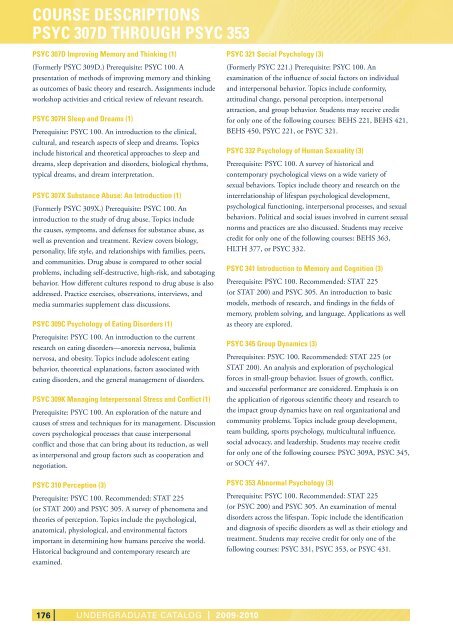UNDERGRADUATE CATALOG - UMUC Europe
UNDERGRADUATE CATALOG - UMUC Europe
UNDERGRADUATE CATALOG - UMUC Europe
You also want an ePaper? Increase the reach of your titles
YUMPU automatically turns print PDFs into web optimized ePapers that Google loves.
CouRsE dEsCRiPtions<br />
PsyC 307d tHRougH PsyC 353<br />
PsyC 307d improving memory and thinking (1)<br />
(Formerly PSYC 309D.) Prerequisite: PSYC 100. A<br />
presentation of methods of improving memory and thinking<br />
as outcomes of basic theory and research. Assignments include<br />
workshop activities and critical review of relevant research.<br />
PsyC 307H sleep and dreams (1)<br />
Prerequisite: PSYC 100. An introduction to the clinical,<br />
cultural, and research aspects of sleep and dreams. Topics<br />
include historical and theoretical approaches to sleep and<br />
dreams, sleep deprivation and disorders, biological rhythms,<br />
typical dreams, and dream interpretation.<br />
PsyC 307x substance Abuse: An introduction (1)<br />
(Formerly PSYC 309X.) Prerequisite: PSYC 100. An<br />
introduction to the study of drug abuse. Topics include<br />
the causes, symptoms, and defenses for substance abuse, as<br />
well as prevention and treatment. Review covers biology,<br />
personality, life style, and relationships with families, peers,<br />
and communities. Drug abuse is compared to other social<br />
problems, including self-destructive, high-risk, and sabotaging<br />
behavior. How different cultures respond to drug abuse is also<br />
addressed. Practice exercises, observations, interviews, and<br />
media summaries supplement class discussions.<br />
PsyC 309C Psychology of Eating disorders (1)<br />
Prerequisite: PSYC 100. An introduction to the current<br />
research on eating disorders—anorexia nervosa, bulimia<br />
nervosa, and obesity. Topics include adolescent eating<br />
behavior, theoretical explanations, factors associated with<br />
eating disorders, and the general management of disorders.<br />
PsyC 309k managing interpersonal stress and Conflict (1)<br />
Prerequisite: PSYC 100. An exploration of the nature and<br />
causes of stress and techniques for its management. Discussion<br />
covers psychological processes that cause interpersonal<br />
conflict and those that can bring about its reduction, as well<br />
as interpersonal and group factors such as cooperation and<br />
negotiation.<br />
PsyC 310 Perception (3)<br />
Prerequisite: PSYC 100. Recommended: STAT 225<br />
(or STAT 200) and PSYC 305. A survey of phenomena and<br />
theories of perception. Topics include the psychological,<br />
anatomical, physiological, and environmental factors<br />
important in determining how humans perceive the world.<br />
Historical background and contemporary research are<br />
examined.<br />
176<br />
UndERGRAdUATE CATALoG | 2009-2010<br />
PsyC 321 social Psychology (3)<br />
(Formerly PSYC 221.) Prerequisite: PSYC 100. An<br />
examination of the influence of social factors on individual<br />
and interpersonal behavior. Topics include conformity,<br />
attitudinal change, personal perception, interpersonal<br />
attraction, and group behavior. Students may receive credit<br />
for only one of the following courses: BEHS 221, BEHS 421,<br />
BEHS 450, PSYC 221, or PSYC 321.<br />
PsyC 332 Psychology of Human sexuality (3)<br />
Prerequisite: PSYC 100. A survey of historical and<br />
contemporary psychological views on a wide variety of<br />
sexual behaviors. Topics include theory and research on the<br />
interrelationship of lifespan psychological development,<br />
psychological functioning, interpersonal processes, and sexual<br />
behaviors. Political and social issues involved in current sexual<br />
norms and practices are also discussed. Students may receive<br />
credit for only one of the following courses: BEHS 363,<br />
HLTH 377, or PSYC 332.<br />
PsyC 341 introduction to memory and Cognition (3)<br />
Prerequisite: PSYC 100. Recommended: STAT 225<br />
(or STAT 200) and PSYC 305. An introduction to basic<br />
models, methods of research, and findings in the fields of<br />
memory, problem solving, and language. Applications as well<br />
as theory are explored.<br />
PsyC 345 group dynamics (3)<br />
Prerequisites: PSYC 100. Recommended: STAT 225 (or<br />
STAT 200). An analysis and exploration of psychological<br />
forces in small-group behavior. Issues of growth, conflict,<br />
and successful performance are considered. Emphasis is on<br />
the application of rigorous scientific theory and research to<br />
the impact group dynamics have on real organizational and<br />
community problems. Topics include group development,<br />
team building, sports psychology, multicultural influence,<br />
social advocacy, and leadership. Students may receive credit<br />
for only one of the following courses: PSYC 309A, PSYC 345,<br />
or SOCY 447.<br />
PsyC 353 Abnormal Psychology (3)<br />
Prerequisite: PSYC 100. Recommended: STAT 225<br />
(or PSYC 200) and PSYC 305. An examination of mental<br />
disorders across the lifespan. Topic include the identification<br />
and diagnosis of specific disorders as well as their etiology and<br />
treatment. Students may receive credit for only one of the<br />
following courses: PSYC 331, PSYC 353, or PSYC 431.






